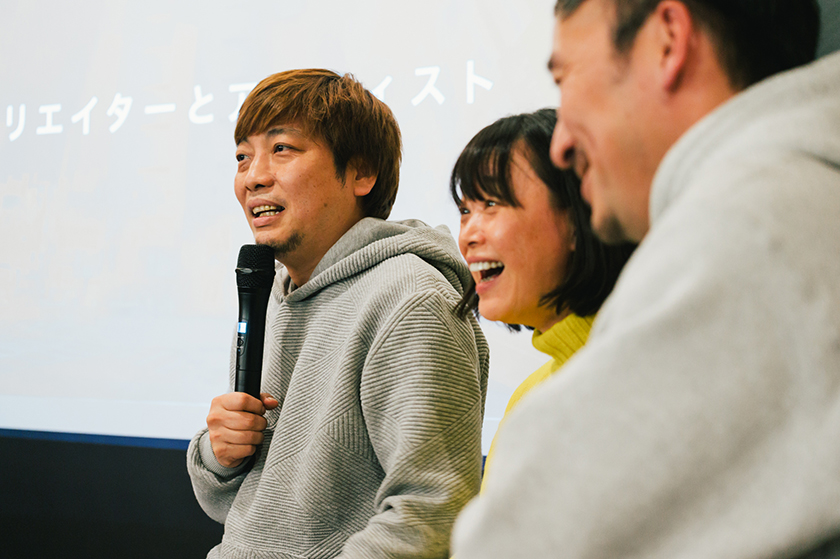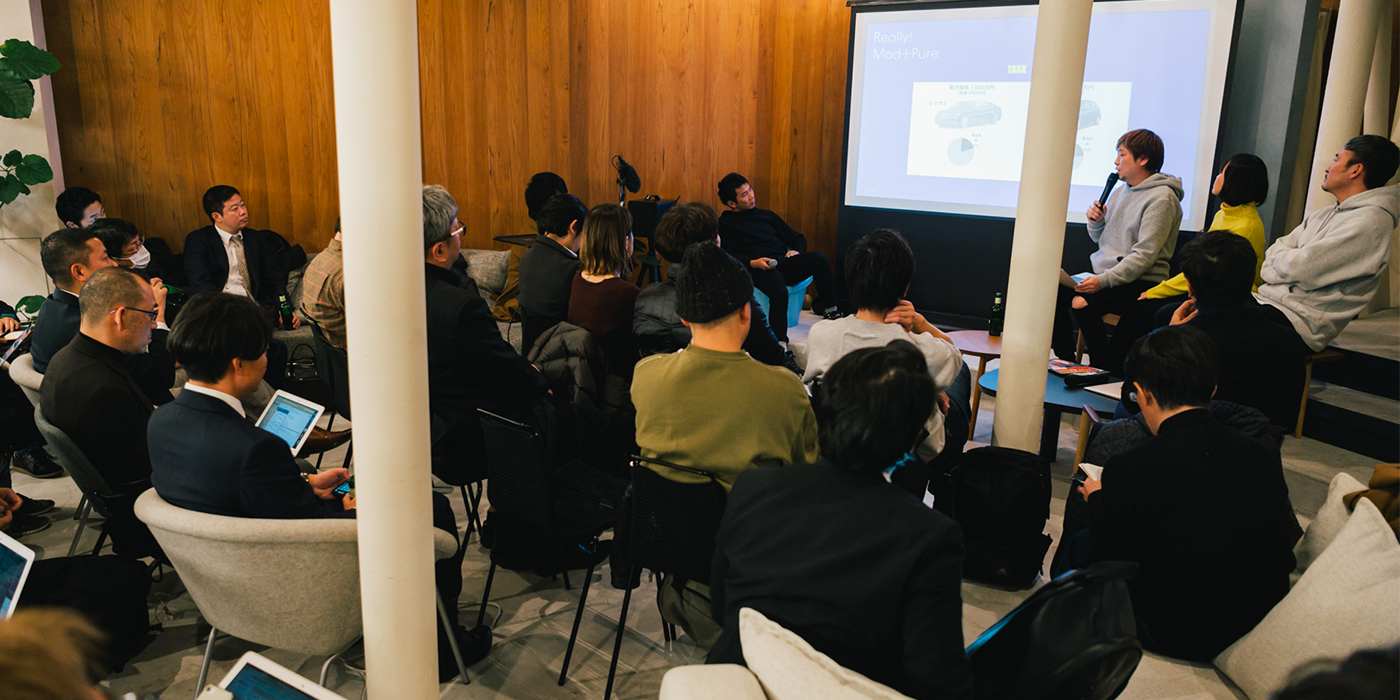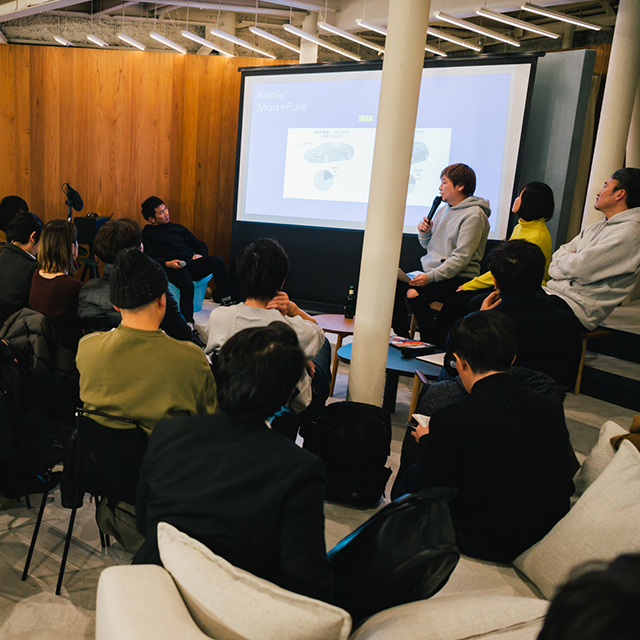On February 3rd, 2020, people gathered at Laugh Out, a shared-office space in Shibuya, to attend an entertainment summit of sorts. The THINK ENTERTAINMENT –The Future of Entertainment Summit-, hosted by Shibuya Mirai Design who has also started the Shibuya 5G Entertainment Project, was set up in hopes of pondering the coming state of entertainment in a 5G era together with other leaders, including the partner of this summit, Avex. Here is the report.
The music market:
shifting from
“listening” to “using.”
Avex’s stance in the
720-degree business
of this age.

The event started with facilitator Jungo Kanayama from Shibuya Mirai Design asking Avex’s Takeya Ino, an executive manager at the label’s HQ, to give the state of address of business in the music industry.
He spoke about this visionary-like definition of music as being the “world’s shortest art form” and how its characteristics of being light in capacity, allowing for replication, being heartwarming and moving allows for easy change in its business structure.
In these regards, you wouldn’t be wrong to say that the first thing to change thanks to the evolution of technology is music. But how did it become so? What changes has music gone through?
Ino “Back in the day, business only existed where the stage was, but then thanks to the phonograph we saw the beginning of business in distributing music. Then thanks to the Walkman, we could listen to music outside on the go. Now, buying CDs has become a way of supporting your favorite artists, a merchandising thing, and subscriptions and streaming has become the way to enjoy music itself, to enjoy the stories of the artists themselves. I think, and this is quite obvious, that becoming a hit is no longer about how many albums or CDs you’ve sold, but about how many people you have touched, and how many times the song is played.”
Ino “There’s more. We’re seeing a variety of new businesses appear revolving around music. Business in the so-called music “listening market”, where people might by a CD of an artist they heard thanks to collabs or tie-up marketing, will change thanks to technology, and we’ll be able to see what content is being played where. All of it. So it will no longer be mostly about conventional music media or the devices their played on, but I think we’ll see the emergence of a music “usage market” where music, all music, becomes business just by being played. I think there is a possibility that business related to artists will go from an already 360-degree thing to encompass even more, a 720-degree business if you will.”

One symbolic example of this would be the prosperity that social platforms like TikTok and Instagram are having where music is no longer just for listening, but for “using,” and that is becoming the business.
Ino “We’re at a time where the value of music lies not in the distribution and enjoyment of music itself, but rather in the originality of the very artist that lives it. In their lifestyle as they create their craft. We’re seeing a movement in putting that value to more use. So, it’s more than just collaborating with popular artists. It’s about cultivating a culture with artists. Avex hopes for people, both users and corporate sectors alike, to align with this new emerging value. The value in artists about the hustle, in artists chasing after their dreams. In regards to culture and brand value, take a look at Rihanna for example. Her collaborating with LVMH, who she adores, to make a perfume, and her collabs with, say, clothing lines, movies, and digital media, this is all becoming the current tide of the times in today’s world. Of course there are certain things she is able to pull off because she is Rihanna, but this also goes beyond the artist as an individual. It pertains to labels and communities and more. I think the coming theme is about making brand.”

Ino expanded on this, saying that as we approach an era of XR (extended reality) we could see more business arise around each element that makes up music as a whole, for instance the artist’s voice, the sound of individual instruments, or even dance moves.
As examples of new entertainments that symbolize this massive change, Ino introduced the crowd to Avex’s projects, DIVE XR FESTIVAL supported by SoftBank, SARF and Star Island.
The DIVE XR FESTIVAL is a borderless event built on science and technology, a so-called parallel world made possible by a mixture of AI and world renown characters from a variety of media worlds such as anime, gaming, manga and the web.

DIVE XR FESTIVAL supported by SoftBank
SARF is short for Sound Augmented Reality Factory. By expanding music subscription culture and streaming services that catered only to music to include all types of sounds and voices, SARF aims to steer society into one big experimentation of sound related AR.
SARF
STAR ISLAND is a new form of Japanese fireworks entertainment that implements technology in a whole new way and has even gained attention when it was held at in Singapore in front of the Marina Bay Sands for a new year’s countdown.

2020 Star Island Singapore
Advancements in technology has dramatically changed the entertainment industry. Participants in the event took notes as they watched captivated.
The borderlines
of entertainment –
technology and reality.
Ideas for the future
that arose
in the talk session.
The introduction by Ino from Avex was followed by the talk session which included himself, Kazuhiko Chuman, head of the KDDI Mugen Lab, and Shinko Osada from Shibuya Mirai Design.
The three panelists started by introducing the form or entertainment or events that they have their sight on.
Osada chose to introduce WONDERFRUIT; Thailand’s answer to Burning Man, and music festival based not only on music, dance and art, but sustainability. This type of entertainment has caught her eye.
Chuman chose to talk about Minerva Schools at KGI. Despite classes being all online, students live in dormitories and rotate between cities across the globe throughout their four years, hence their campus being “the world.” Chuman spoke about the importance of this kind of unexpectedness and uniqueness.
Kanayama, the facilitator for the event, also jumped on board to mention PY1. Founded by Guy Laliberté, creator of Cirque du Soleil, PY1 is a creative project that takes the shape of a giant pyramid in urban centers offering different forms of entertainment.
Ino spoke on RODEN CRATER. Created by James Turell, RODEN CRATER is a celestial observatory/art project that has been also trending as an opportunity for the wealthy — with donations coming from people such as Kanye West — to invest in ways of escaping everyday normalcy.
The discussion held after touched on the borderlines of entertainment as well as technology and its relationship with what we call “real.”

Chuman “In the old days it was all analog, so you had to go somewhere, to an actual place to get that special feel-good experience. Everything else was just the norm. But now thanks to technology you can have those out-of-the-ordinary experiences pretty much as a part of your daily norm. The borderlines have become blurred. That’s why concerts and events are seeing the majority of monetization now. I think spaces that people gather are standing out as the way to get that special feel-good entertainment experience again.”
Ino “On the contrary, I’m up for getting rid of boarders. For example, the Turtle Talk attraction at Tokyo Disney Sea is kind of like VTuber entertainment and can probably also be used for educational purposes. You could create new values and opportunities if you took Avatar technology and fused it with totally different industries.”
Osada, who has experience in producing extreme entertainment in the sports industry, claims that is important to maintain the borderlines while creating and directing better/more intense escapes from everyday normalcy.
Osada “There is a clear line between everyday reality and that which is not and when it comes down to it entertainment is meant to excite. I think it’s something that is not a part of normalcy. In the past I was part of a project that had F1 racers race through Senso-ji Temple grounds in Asakusa. Things get pretty exciting at that level of non-normalcy.”

And how will things change in the real space as technology continues to evolve?
Ino “Not only does new technology give birth to entertainment, it can also give rise to experiences that give you that escape, that special worry-free experience. For example, during one of my discussions with an energy company, the topic turned to the idea of creating energy below ground, and that when generators are working, the heat that they emit could be sent above ground and used to create a music festival that people could attend in T-shirts in the middle of winter. I think ideas like that have potential.”
Kanayama “In that context, I think that public spaces like parks are important. Kids usually stop going to parks as they get older, but what if we could use technology to give parks some background music. Like, at a certain time if you’re wearing headphones, you can hear music. It could even be VR or AR, showing performances or things by overseas choreographers or something. I can already see it, a future where urban spaces become places of entertainment.”

Chuman “Marshmellow had a live concert in Fortnite, didn’t he? When the song Fly came on, everyone was also able to start flying. That kind of stuff is impossible at a real festival. Which is exactly what gives it meaning to doing it virtually.”
Osada “Yeah. It’s one thing to gather in real life thanks to technology, but I really like when people are able to do things together from around the world like at Esport battles. It really speaks on diversity. Say, someone who was born way out in the country-side and are unable to even leave their home, they can’t go to real-life events, but maybe they kill it at games. Those people can also be a part of all that, and the scene is open and accepting. I think a world like that is full of dreams.”
After an exciting following discussion full of ideas and Q and A’s the event came to an end.

Technology is almost absolutely at a tipping point. There are plenty of challenges and just as many chances awaiting. Not to mention the tremendous advancements in the entertainment realm overseas.
It is easy to see why holding events where a diverse ensemble of players can come together and exchange ideas has so much importance. It is just as easy to see why this talk event is worth checking out in the future. And last but not least, we can all look forward to a new, unimaginable form of entertainment to come out of Japan thanks to challenge-taking by entities like Avex.









